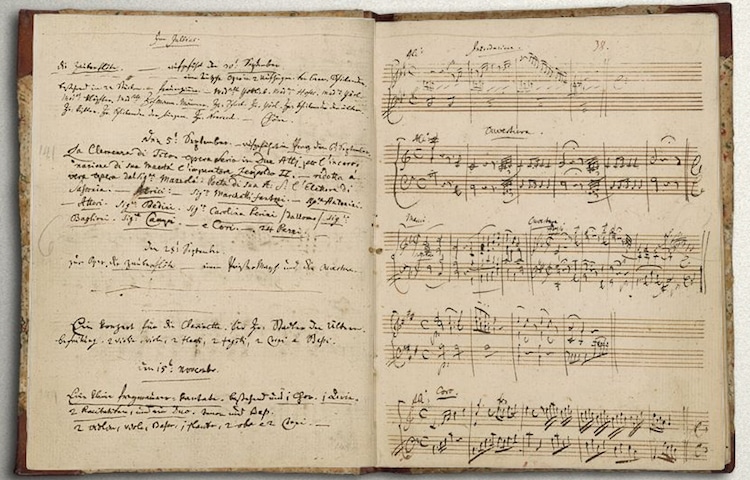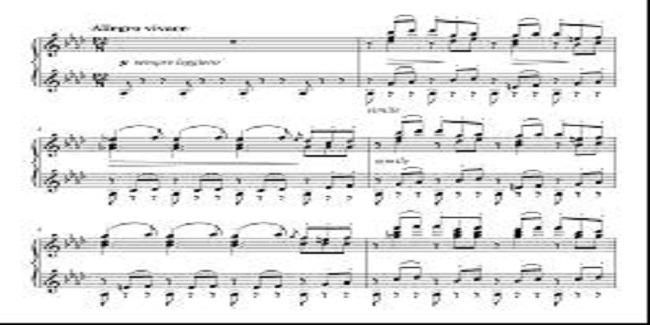

#Familiar famous music compositions series
Everything about the score is larger than life, from its series of fanfares to the sweeping chariot race to the heavenly church organ that accompanies the appearance of Jesus onscreen. The Biblical epic Ben-Hur got a suitably grand score from Miklos Rozsa with two-and-a-half hours of music, it was the longest score used in a film at that time. Interestingly, director Sidney Pollack was set on using African music for the score and originally cut the film that way Barry had to personally persuade him to change direction. It won Barry his second-to-last Oscar for Best Original Score (he’d win again in 1990 for Dances With Wolves) and spun off a hit single, “The Music of Goodbye (Love Theme)” by Melissa Manchester & Al Jarreau. Though a short score (only covering a half-hour of the film) it contains some of Barry’s prettiest and most melodically grabbing themes.

#Familiar famous music compositions movie
This was one of the later movie scores by the English composer John Barry, who’s forever associated with his James Bond soundtracks. With a vocal performed by Tex Ritter in the movie, the song’s percussive horse-hoof sound was actually made by a Hammond Novachord, an instrument invented in 1935 that was a precursor to the synthesizer. The plot of High Noon builds slowly to its climactic gun battle, and Dimitri Tomkin’s film score is all dramatic tension, with recurring themes including a horse’s advancing hooves and the ominous melody of the title tune. Combining jazz, pop and New Age elements, his Golden Pond score captures both the rustic New England setting of the film, and the bittersweet story of a couple, played by Henry Fonda and Katharine Hepburn, who reconnect and find acceptance late in life. Jazz-associated pianist Dave Grusin is one of the more celebrated film composers of the modern era – for starters, all the non-Paul Simon music in The Graduate was his – and also the owner of the GRP label. Bernstein was frustrated that director Elia Kazan discarded some of his work, a possible reason why he never scored another film. Though now recognized as one of the great soundtracks, it proved a bit controversial at the time, since Bernstein envisioned the music as a crucial part of story development, a device that would interact with and comment on the action and the dialogue. On the Waterfront was Leonard Bernstein’s only proper movie score, not counting the famous musicals ( West Side Story, Candide) that were adapted to film. He also wrote a tune you’ve almost certainly heard: “Unchained Melody.” – Brett Milano 70: On the Waterfront (1954) But Pennsylvania-born composer Alex North was a true musical eclectic, who also studied with Aaron Copland and wrote symphonies he famously wrote a score for 2001: A Space Odyssey that Stanley Kubrick never used. – Brett Milano 71: A Streetcar Named Desire (1951)Ī Streetcar Named Desire was one of the first mainstream films ever to have a fully jazz-based film score, as befits its New Orleans setting. Film scholars have pored over this score for decades and in 2012 they unearthed an unused song, “The Paramount Don’t Want Me Blues,” a musing of Norma’s that was deemed too much of an in-joke at the time. Accordingly, the score might be called one of the first mash-ups, containing snippets of jazz and popular song, along with more haunting themes that signify Norma’s insanity. The wonder of Franz Waxman’s soundtrack to Sunset Boulevard was that it took you inside Norma Desmond’s head, which was a cluttered place indeed.

– Brett Milano 72: Sunset Boulevard (1950) All the hypnotic Glass trademarks are here and the circular nature of Glass’ music underlines the unseen connections between the characters, to alternately soothing and chilling effect. There couldn’t have been a better choice than Philip Glass to score an intense, psychological film about three women linked in different decades by the works of Virginia Woolf. Frank Sinatra’s version is beautifully chilling (it’s one of his first tracks to include a minute-long orchestral intro), as is the latter-day version by Patricia Barber. So with the mix of love, sex and death… you might call this a proto-goth song. In the song, Laura is the ultimate, untouchable object of desire in the movie she is a murdered woman with whom a police detective played by Dana Andrews becomes obsessed. A singularly haunting score by David Raskin, Laura is largely built around variations of the title song, which has an evocative lyric by Johnny Mercer.


 0 kommentar(er)
0 kommentar(er)
